 Andrew Chan
Andrew Chan
In a retrospective of films by the Thai director, ruminations on the complexities and contradictions of lives filled with both
boundlessness and impossibility.
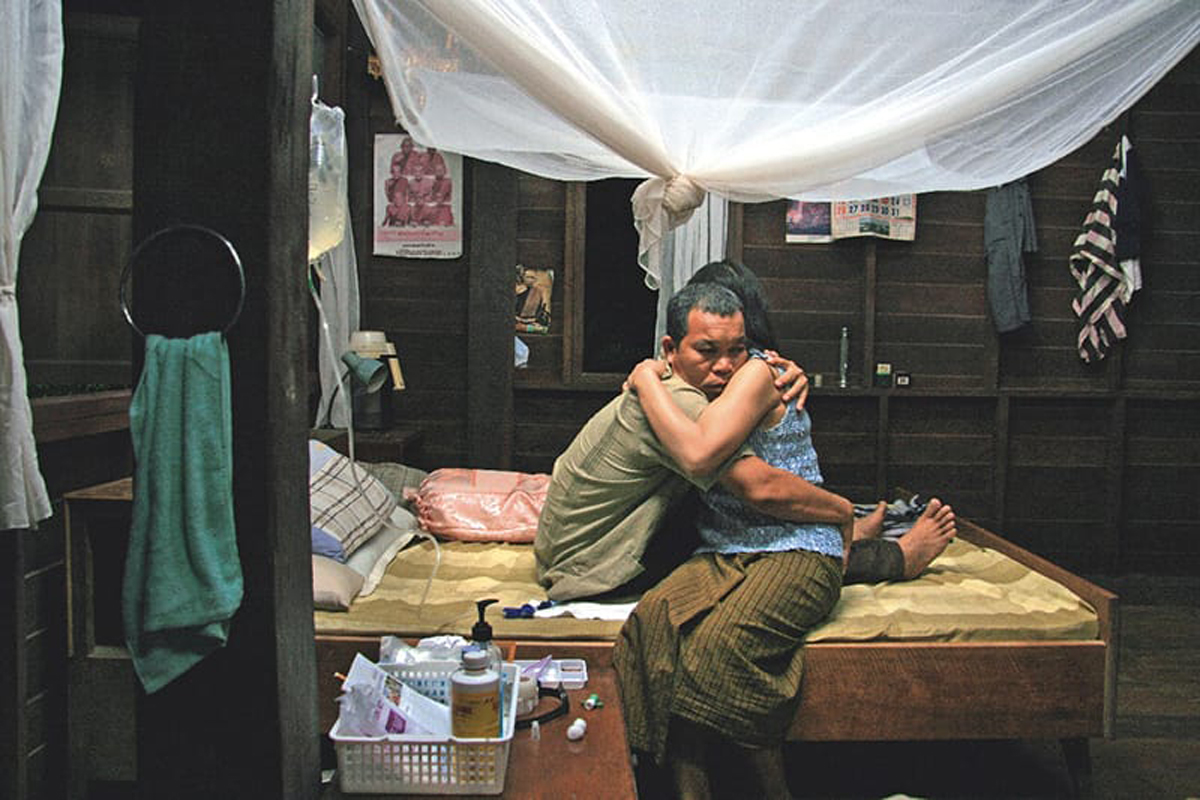
Thanapat Saisaymar as Boonmee and Natthakarn Aphaiwonk as Huay in Uncle Boonmee Who Can Recall His Past Lives. Courtesy Kick the Machine.
“The World of Apichatpong Weerasethakul,” Film at Lincoln Center,
New York City, through May 16, 2023
• • •
Cinephiles are known to obsess over the question of what film can do that no other medium can. But in the case of Thai auteur Apichatpong Weerasethakul, one of the most influential filmmakers to emerge in the past quarter-century, much of the allure of his work lies in how it evokes other vocations, including two that loomed large in his early life. Both of Weerasethakul’s parents were physicians, and not only do his films spend a lot of time in and around clinics and hospitals, with characters who endure all manner of mysterious ailments, but they also have a recuperative effect that belies their subtly unnerving insights into human suffering. Weerasethakul’s oeuvre likewise sustains a meaningful connection to architecture, the profession for which he trained in his university years. His films are highly sensitive to nuances of space and light, and some of their most exquisite moments occur in open-air pavilions known as salas, a distinctive architectural feature of rural Thailand that offers shelter and rest for travelers. Even in scenes set in enclosed environments, Weerasethakul is always looking for ways to aerate the screen and make it breathable, letting nature in through stray sounds or a view from a window. In his world, interiors bleed into exteriors just as the body overflows its borders, or as one life-form mutates into others.
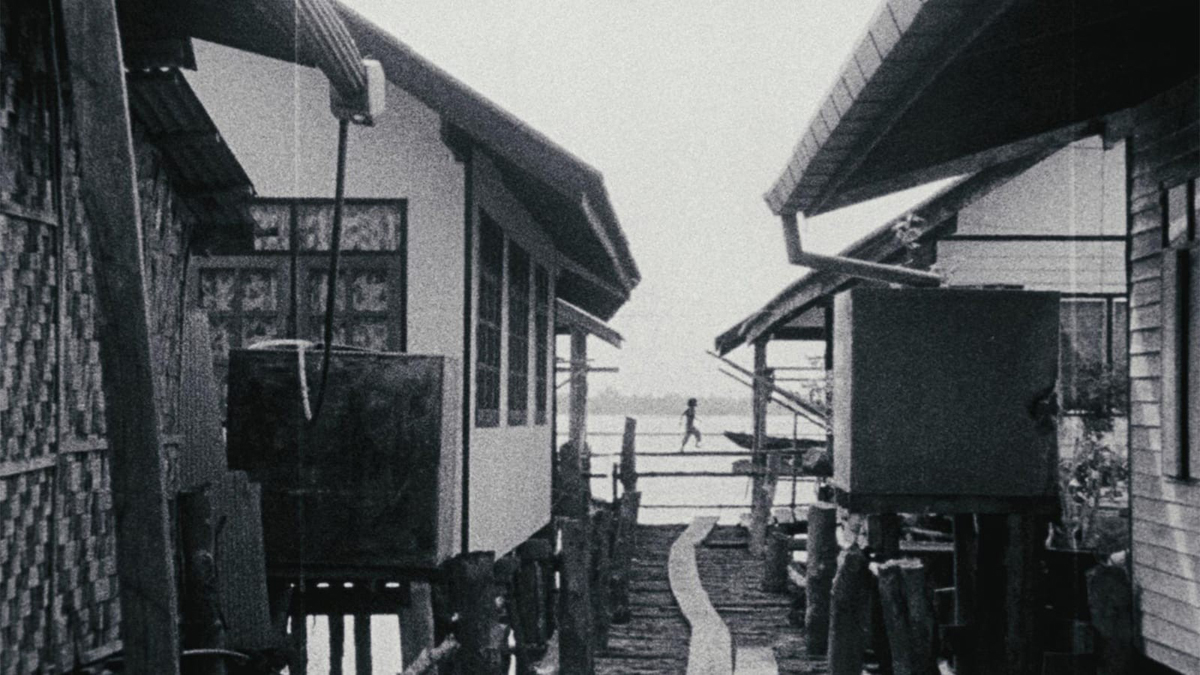
Still from Mysterious Object at Noon. Courtesy Janus Films.
A career-spanning retrospective now playing at Film at Lincoln Center provides an opportunity to marvel anew at how Weerasethakul’s cinema creates these states of permeability. The most obvious way he achieves this is with his shape-shifting approach to form, which fosters a feeling of unbridled imagination and improvisation. In his debut feature, Mysterious Object at Noon (2000), Weerasethakul turns the game of exquisite corpse into an occasion for meeting strangers across the Thai countryside, whom he enlists to expand a tall tale that grows wilder with each off-the-cuff convolution. The results are genuinely baffling, as the anything-goes surrealism of this communally narrated folktale butts up against grainy black-and-white images that put us in mind of a low-budget ethnographic documentary. Though Weerasethakul’s subsequent films have tidier structures, they’re no less playful. A few of them have bifurcated narratives that make room for digressions and dreams; Weerasethakul loves to familiarize viewers with a basic premise before jostling them out of it without warning. Sometimes these abrupt detours take place within a single scene. In the opening section of Syndromes and a Century (2006), a diptych of variations on his parents’ love story, our eyes are prepared to follow a group of hospital staffers down a hallway but are suddenly distracted by a grassy field outside the facility. The camera, as if hypnotized, lingers so long on this quotidian vista that the actors, still within earshot, end up breaking character.
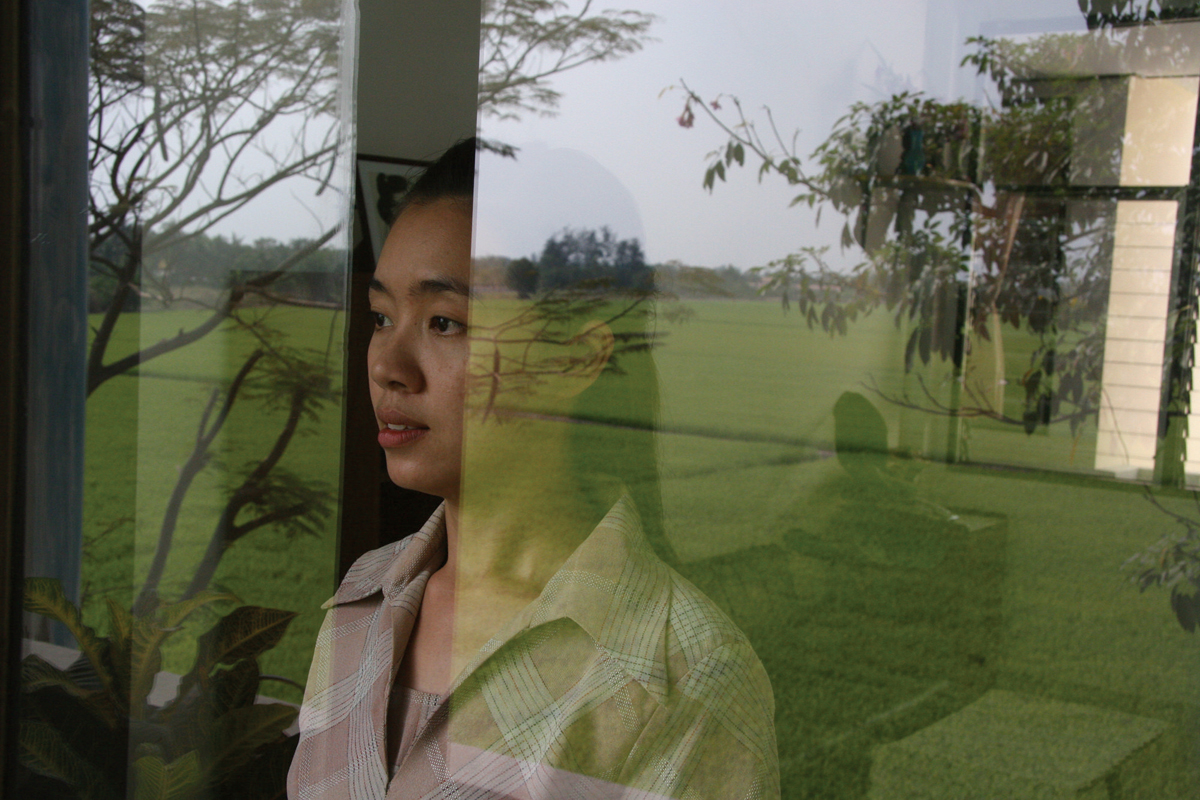
Nantarat Sawaddikul as Dr. Toey in Syndromes and a Century. Courtesy FilmGrab.
On paper, Weerasethakul’s methods might suggest chaos or, worse, contrivance. But for all its formal restlessness, his work is fiercely disciplined in its temperament and cohesive in its preoccupations. Like other cinematic poets of the sublime—Carl Theodor Dreyer, Andrei Tarkovsky, Terrence Malick—he’s given to metaphysical ruminations on love and death. What distinguishes him is the lightness of his touch: the camera is, for the most part, serenely static; the editing is unhurried; the music selections favor gentle, cutesy Thai pop songs instead of portentous orchestral swells; and the actors, who never raise their voices, are usually no louder than the crickets chirping or the breeze blowing on the soundtrack. As an authorial presence, Weerasethakul is equally subdued. Even as every frame bears his unmistakable signature, he never comes across as a prophet guiding us down a path to enlightenment. His movies are devoid of predetermined wisdom, partly because they always feel like they’re in the process of being discovered. Emerging during an extended period of political repression and violence in the director’s homeland, these films pair the idea of boundless possibility, implicit in their branching narratives and supernatural elements, with intimations of destinies foreclosed.
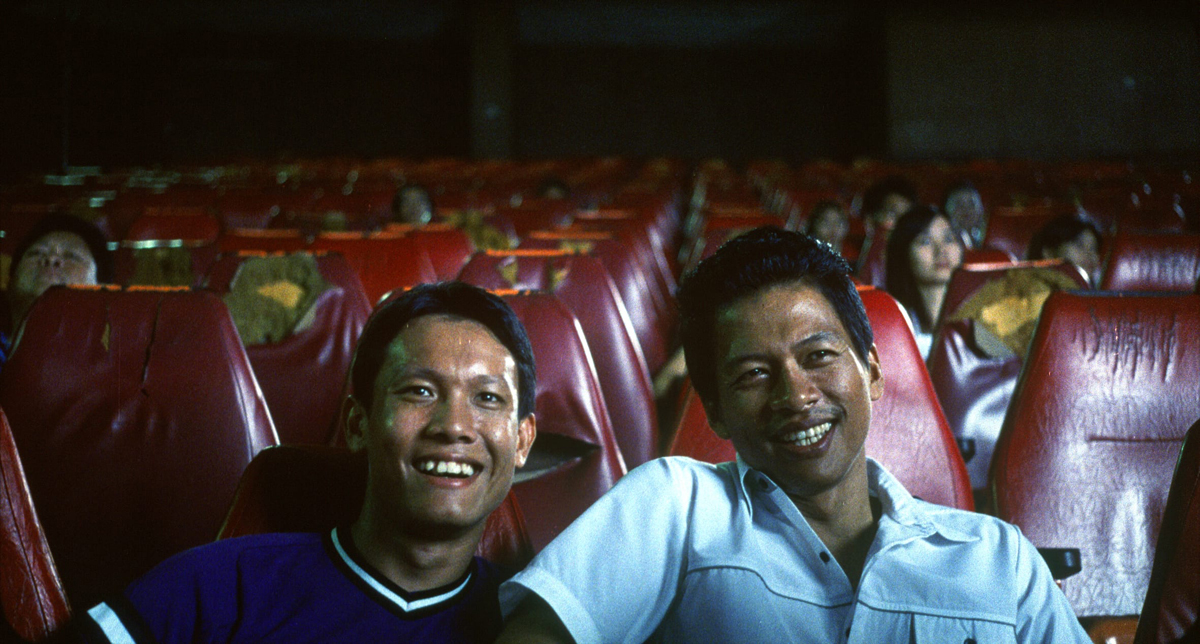
Sakda Kaewbuadee as Tong and Banlop Lomnoi as Keng in Tropical Malady. Courtesy Strand Releasing.
This is poignantly clear in Weerasethakul’s approach to romance, which has a tenderness that often proves too much for this world. In Tropical Malady (2004), the frank eroticism between two men—matter-of-factly conveyed in scenes of them licking each other’s hands and flirting in a dark movie theater—is cut short when the film slides into the realm of animistic myth, denying us the pleasure of seeing the protagonists consummate their love in the real world. Such evanescence pervades Weerasethakul’s Palme d’Or–winning Uncle Boonmee Who Can Recall His Past Lives (2010), in which a dying man mournfully embraces the ghost of his long-deceased wife, and Cemetery of Splendor (2015), whose climax revolves around a startling exchange of intimacy achievable only through the transmigration of a beloved’s soul. This sense of love as something that must be experienced obliquely, as a barely tangible memory or a tremor from the great beyond, finds abstract expression in one of the most captivating short films playing in the retrospective: Emerald (2007), which overlays the voices of actors musing on love and youth atop the haunting image of an empty hotel room filling up with radiant feathers. Weerasethakul presents each of these scenarios with such beguiling calm that you forget they all require a suspension of disbelief. Anything can happen in his movies, but that’s only because cinema is able to enact what can never be promised us in real life.
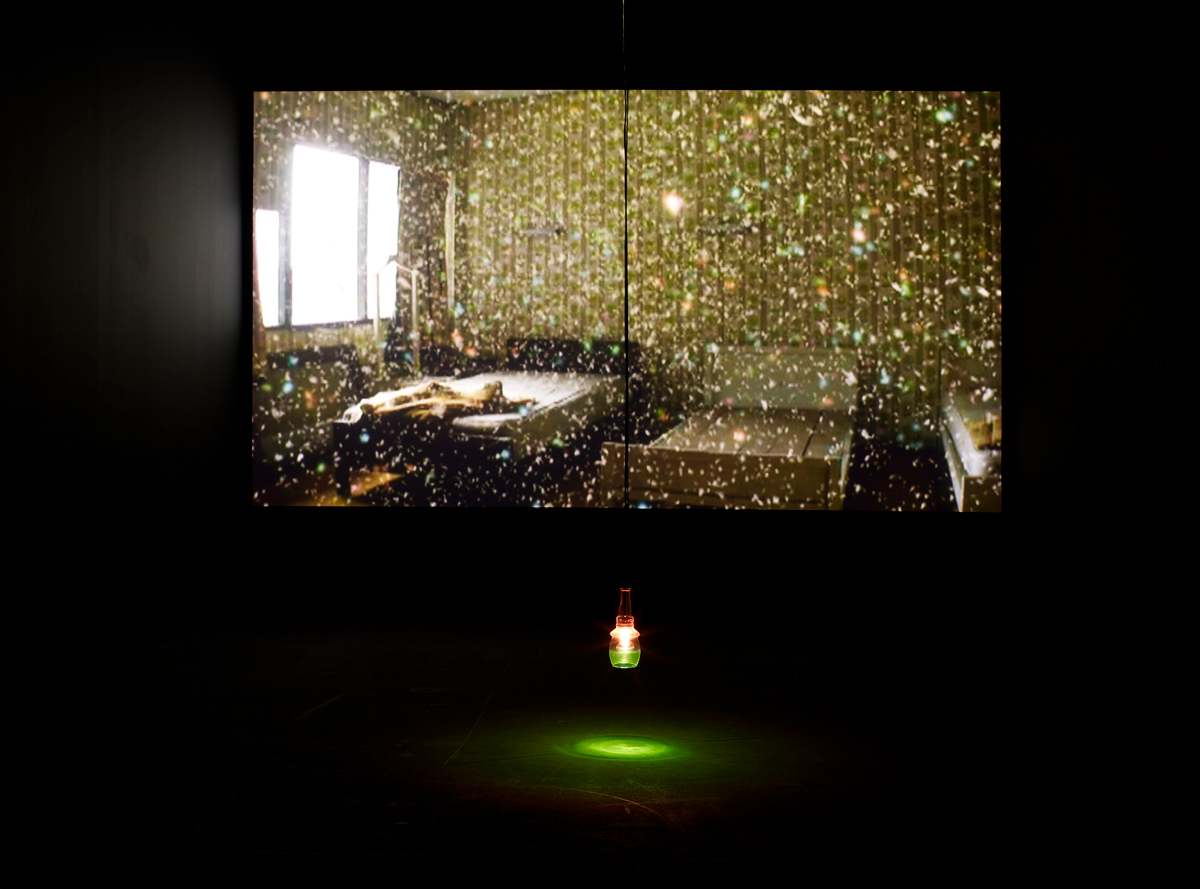
Still from Emerald. Courtesy Film at Lincoln Center.
Amorous delight is given freer rein in Blissfully Yours (2002)—a film that tends to get lost in discussions of Weerasethakul’s work, perhaps because it has long been unavailable to stream. The most straightforwardly structured of his features, it follows a young couple on a romantic getaway in the jungle. Their sun-dappled trip establishes a mood so leisurely, so close to drowsy reverie, that even a close-up of the man’s penis being fondled by his girlfriend seems like just another observation of the tranquil landscape. But sexual fulfillment is only a fleeting respite from stigmatization and sickness; the man’s skin has broken out with a rash that we assume is caused by the stress of being an undocumented immigrant who doesn’t speak the local language. And for an older woman (the wonderfully expressive Weerasethakul regular Jenjira Pongpas) who’s been trailing the protagonists on their journey and watching them through the foliage, the lovers’ momentary contentment provokes longing and loneliness. Their seemingly harmless idyll stirs pain in someone else; it’s a paradise that necessitates the exclusion of another.
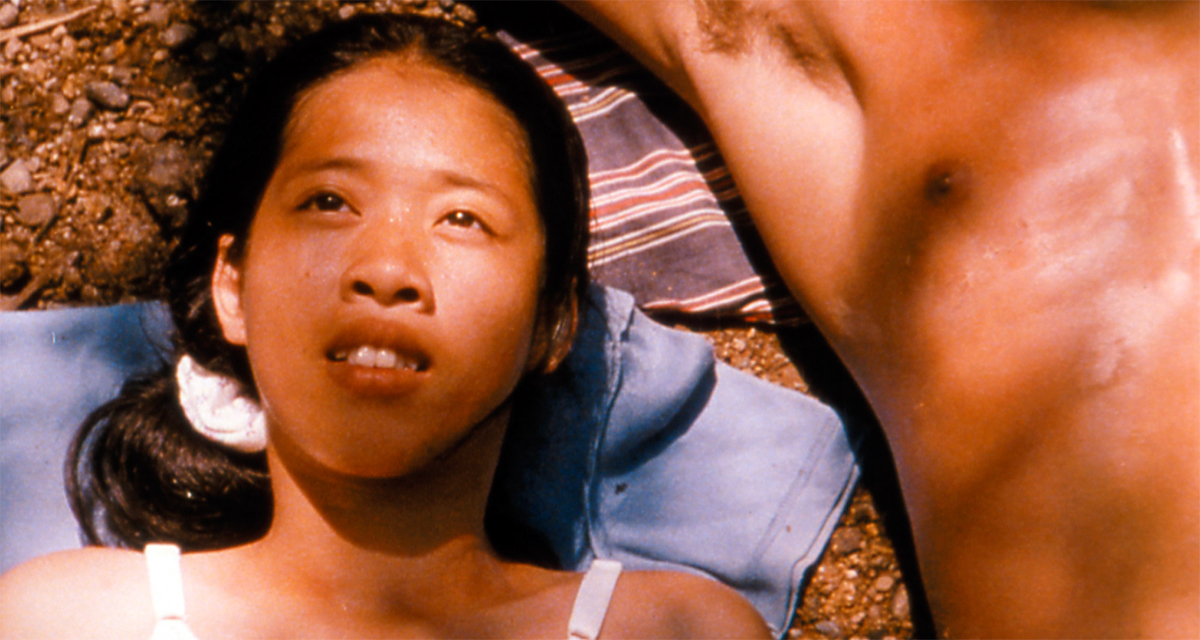
Kanokporn Tongaram as Roong in Blissfully Yours. Courtesy Film at Lincoln Center.
Two decades into his career, Weerasethakul may be at risk of being reduced to an avatar of the values we project onto him. It’s tempting to read the languorousness of his style, and the patience it requires from audiences, as a virtuous rebuke of our fast-paced, disposable moving-image culture. But in revisiting his films, we can see that they offer no simple answers. They confound as much as they console, unsettle as much as they soothe. Even as they affirm the existence of a spiritual dimension, they never tell us what lessons to draw from it or how it might help us make sense of our lives. Blissfully Yours, to my mind the most breathtaking of all these works, shows us that beauty—ever present but frequently ungraspable—is no surefire cure for the afflictions of the soul.
Andrew Chan is a writer and editor living in Brooklyn, New York. His first book, Why Mariah Carey Matters, will be published by University of Texas Press in September.